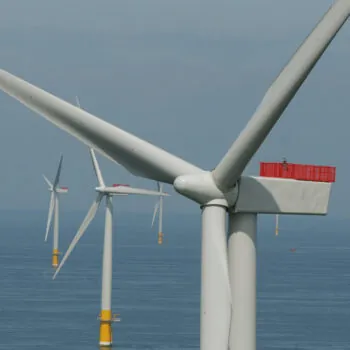The North Sea is one of the world’s richest offshore wind power resources. With thirteen countries sharing its coastline, tapping into this potential requires a mix of diplomacy and engineering. Where others might see a political mine field, Nicholas Mabey SM ’93 sees opportunity.
“We have to design solutions where you take into consideration both existing technologies and the various political structures at play,” explains Mabey, co-founder and Chief Executive of E3G, an environmental think tank headquartered in London.
Rather than having thirteen different sets of grids and policies, Mabey and E3G helped establish the North Seas Countries Offshore Grid Initiative. The result was a unified approach to harnessing wind power in the North Seas.
This is just one example of how Mabey has blended his unique combination of expertise in engineering, economics, and politics with his passion for finding solutions to climate change.
Mabey first became interested in climate change while completing his degree in mechanical engineering from the University of Bristol. After graduation, Mabey noticed a trend: there were next to no mechanical engineering jobs in renewable energy.
“I had tried to find renewable energy work in the UK but there wasn’t any,” recalls Mabey. “So I started to look at the economics and politics of renewable energy to figure out why something that would clearly be more cost effective and environmentally friendly wasn’t being done.”
That search led him to the MIT Technology and Policy Program, a degree program that combines graduate-level study in a subject like mechanical engineering with a thesis focused on technology policy issues.
“My time at MIT gave me the confidence to tackle big difficult problems by using both quantitative methods and a qualitative understanding of real-world limitations and uncertainty,” says Mabey.
This confidence led Mabey to a job in government. He helped build the UK’s first-ever environmental diplomacy network. As a senior advisor in the UK Prime Minister’s Strategy Unit, he worked on a wide range of international and environmental issues.
While working in government, Mabey noticed a disconnect between technology companies, academia, and government. All three sectors were trying to solve issues on their own without consulting each other. Mabey and several colleagues saw a gap in how institutions approached environmental problems and came up with the idea for E3G to connect the dots.
“We founded E3G to act as a broker between mainstream institutions,” he adds. As was the case with the North Seas Countries Offshore Grid Initiative, E3G approaches problems by connecting government leaders, policy makers, and technological experts.
For Mabey, this approach to finding solutions for climate change draws upon his diverse career experiences. “In a sense, co-founding E3G combined the engineering and design approach I learned at MIT with the political approach I learned working in government,” he explains.
In addition to helping thirteen countries establish a single grid for wind power, E3G has helped the Chinese government establish pilots of the low carbon economy at a regional level and designed and supported the creation of a public green investment bank in the UK.
Whatever the problem Mabey is crafting policies for, he believes mechanical engineers will play a vital role. “I think mechanical engineers are at the heart of responding to the challenges we face due to climate change,” adds Mabey. “There’s a confluence of a problem with climate change along with amazing new technologies and mechanical engineers sit directly between the two.”
This Alumni Profile originally appeared in MIT's Department of Mechanical Engineering's Magazine.



